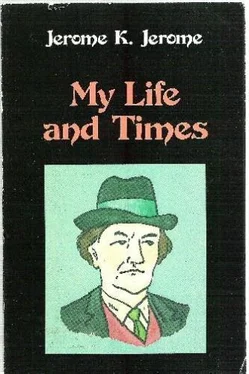Fuel was our difficulty. It's an ill wind that blows nobody good. The news that a shelled village had been finally abandoned by its inhabitants flew like wildfire. It was a question of who could get there first, and drag out the timbers from the shattered houses. Green wood was no good: though, up in the dug-outs, it was the only thing to be had. They say there is no smoke without fire. It is not true. You can have a dug-out so full of smoke that you have to light a match to find the fire. If it's only French matches you have, it may take a boxfull. It was our primus stoves that saved us. Each man's primus was his vestal fire. We kept them burning day and night: cooked by them, dried our clothes, and thawed our feet before going to bed. Mud was our curse. The rain never ceased. We lived in mud. Our section worked the Argonne forest. Our point de secours , where we waited, was some hundred yards or so behind the front trenches. The wounded, after having passed through the Field Dressing Station, were brought to us on stretchers; or came limping to us, twisting their faces as they walked. So long as we were within call we could wander at our will, creep to where the barbed-wire ended, and look out upon the mud beyond. Black, silent, still, like some petrified river piercing the forest: floating on it, here and there, white bones, a man's boot (the sole uppermost), a horse's head (the eyes missing). Among the trees the other side, the stone shelters where the German sentries watched.
The second night I was on duty, I heard a curious whistling just above my head. I thought it some night bird, and looked up. It came again, and I moved a few steps to get a better view. Suddenly something butted me in the stomach and knocked me down; and the next moment I heard a loud noise, and a little horse, tethered to a tree some few yards off, leapt up into the air and dropped down dead. It was Monsieur Le Médecin, a chemist from Peronne, who had bowled me over, and was dragging me down the steps into his dug-out. I didn't hang about another time, when I heard that whistling in the trees.
There must have been some means of communication between the men themselves on either side. During the two hours, every afternoon, when the little tramway was kept busy, hauling up food, both French and German batteries were silent. When the last barrel of flour, the last sack of potatoes, had been rolled in safety down the steps of the field kitchen, the firing would break out again. When a German mine exploded, the Frenchmen who ought to have been killed, were invariably a quarter of a mile away sawing wood. One takes it that the German peasant lads possessed like gift of intuition, telling them when it would be good for their health's sake to take walking exercise.
A pity the common soldiers could not have been left to make the peace. There might have been no need for Leagues of Nations. I remember one midday coming upon two soldiers, sitting on a log. One was a French poilu and the other his German prisoner. They were sharing the Frenchman's lunch. The conqueror's gun lay on the ground, between them.
It was the night call that we dreaded. We had to drive without lights: through the dense forest, up and down steep, narrow ways with sudden turns and hairpin bends—one had to trust to memory: and down below, in the valley, were the white mists into which one strained one's eyes till it felt as if they were dropping out of their sockets. We had to hasten all we dared, the lives of men behind us depending upon time. Besides, we might be wanted for another journey. We often were. There ought at times to have been a moon, according to the almanac: but to that land of ceaseless rain she rarely came. It was nerve-racking work. The only thing to do was not to think about it till the moment came. It is the advice that is given, I understand, to men waiting to be hanged. One takes off one's boots, and tunic, blows out the candle and turns in. A rat drops from somewhere on to the table, becomes immovable. By the light of the smouldering logs, we look at one another. One tries to remember whether one really did put everything eatable back into the tin. Even then they work the covers off, somehow—clever little devils. Well, if he does, he does. Perhaps he will be satisfied with the candle. Ambulance Driver Nine turns his head to the wall. Suddenly he is up again. A footstep is stumbling along the wooden gangway. It is coming nearer. He holds his breath. The gods be praised, it passes. With a sigh of relief he lies down again, and closes his eyes.
The next moment—or so it seems to him—a light is flashing in his eyes. A bearded, blue-coated figure is standing over him. Ambulance to start immediately! (“ Ambulance faut partir .”) The bearded figure, under its blue iron helmet, kindly lights the candle (rat having providentially found something more tasty) and departs. Ambulance Driver Nine struggles half unconsciously into his clothes and follows up the steps. Pierre, the aide , is already grinding away at the starting handle, and becoming exhausted. One brushes him aside and takes one's turn, and with the twentieth swing—or thereabouts—the car answers with a sudden roar, as of some great drowsy animal awakened from its slumbers; and Pierre, who has been cursing her with all the oaths of Gascony, pats her on the bonnet and is almost amorous. A shadowy group emerges apparently from the ground. Two stretchers and three assis is the tale. The stretchers are hoisted up and fitted swiftly into their hangings. The three assis mount slowly and shuffle painfully into their places. Rifles and knapsacks are piled up beside them, and the doors are clanged to. Another “case” is to be picked up on the way—at Champ Cambon. You take the first road on the left, after passing the ruins of the Ferme de Forêt, and the camp is just beyond the level crossing. It seems you cannot miss it. And Ambulance Driver Nine climbs into his seat.
Through the forest, he keeps his eyes upon the strip of sky above his head. Always he must be in the exact centre of that narrow strip of sky. And it will wobble. Pierre sits on the foot-board, his eyes glued to the road. “ Gauche, gauche ,” he cries suddenly. Driver Number Nine pulls the wheel to the left. “ A droit ,” shrieks Pierre. Which the devil does he mean? And what has become of the sky? Where's the damned thing gone to? The deep ditch that he knows to be on either side of the road seems to be calling to him like some muddy Lorelei. Suddenly the sky reappears. It seems to have come from behind him. He breathes once more.
“ Arretez ,” cries Pierre, a little later. He has detected a vague, shapeless mass that might be the ruins of a farm. He descends. One hears his footsteps squelching through the mud. He returns triumphant. It is a farm. Things seem to be shaping well. Now, all they have to do is to look out for a road on the left. They find a road on the left—or hope they have. The descent appears to be steep. The car begins to jump and jolt. “ Doucement, camarade—doucement! ” comes an agonized cry from within. Pierre opens the little window and explains that it cannot be helped. It is a mauvaise route: and there is silence. The route becomes more and more mauvaise . Is it a road, or are they lost? Every minute the car seems as if it were about to stand on its head. Ambulance Driver Nine recalls grim stories of the mess-room: of nights spent beside a mud-locked car, listening to groans and whispered prayers: of cars overturned, their load of dying men mingled in a ghastly heap of writhing limbs, from which the bandages have come undone. In spite of the damp chill night, a cold sweat breaks out all over him. Heedless of Pierre's remonstrances, he switches on his electric torch and flashes it downwards. Yes, it is a road of sorts, chiefly of shell-holes, apparently. The car crashes in and out of them. If the axles do not break, they may get down. The axles do not break, by some miracle. Pierre gives a whoop of joy as the car straightens herself out. They have reached the level, and the next moment they bump over the crossing, and hear the welcome voice of a sentry.
Читать дальше










